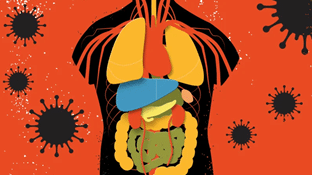5 Things to Know About COVID-19 and Your Gut
Did you know that COVID-19 can affect your digestive tract?
In a recent Time article, “Unusual Symptoms of Coronavirus: What We Know So Far,” health writer Alice Park explores symptoms related to COVID-19 that go beyond cough, fever, muscle aches, headaches and difficulty breathing. She discusses other symptoms including skin rashes, kidney issues, and those involving the digestive system. Park spoke to Brennan M. Spiegel, MD, FACG, who is co-editor-in-chief of The American Journal of Gastroenterology.
 Brennan M. Spiegel,MD, FACG
Brennan M. Spiegel,MD, FACG Here’s what you should know about COVID-19 and your gut:
- When gut experts learned about how the SARS-CoV-2 virus latches on to the body’s cells to launch infection, they realized COVID-19 symptoms wouldn’t be limited to the lungs.
- In order to bind to a cell, the virus uses a receptor called ACE2 which is found on lung cells, but also abundant in intestinal cells. “We were all thinking the same thing,” says Dr. Brennan Spiegel, director of health services research at Cedars-Sinai Medical Center and professor of medicine and public health there and at University of California, Los Angeles. “We knew ACE2 is expressed so heavily in the gastrointestinal (GI) tract and we know the virus is in the saliva. So this thing could be getting into the GI system because it’s in saliva, and we swallow saliva.”
- As more people have developed COVID-19, it’s become clear that not all of those infected display the classic respiratory symptoms that doctors focused on early in the pandemic; many people only experience diarrhea, nausea and vomiting. An influential New England Journal of Medicine paper describing COVID-19 symptoms, published in February, said that only 3.8% of patients had diarrhea. “A lot of doctors took that to mean that if someone had diarrhea, then they probably don’t have COVID-19,” says Spiegel. “That has been proven wrong, or inconsistent. But that set the stage for our understanding that well, maybe [COVID-19] isn’t really a GI issue at all.”
- Not only does it seem like COVID-19 can impact the GI system, evidence suggests that when it does, it can have an especially damaging effect on patients. In a study published in the American Journal of Gastroenterology, Spiegel worked with colleagues in Wuhan, China, where the virus first emerged in humans, and found that people with intestinal complaints tend to be diagnosed later, and also tend to endure longer infections. Most likely, that’s because the GI system is a “massive immune organ,” he says. “Once you are infected, it takes a long time to clear the virus out. We found that on average people have diarrhea for five days, with a range from one to 14 days.”
- Appreciating that COVID-19 can affect the gut as well as the respiratory system is critical, especially when it comes to controlling spread of infection. Studies have shown that this virus can be shed in the feces, which means that shared bathrooms can be a source of infection. Spiegel advises people who are diagnosed with COVID-19 and still at home to use separate bathrooms from the rest of their house- or apartment-mates if possible, and if not, then separate rolls of toilet paper. He also suggests that everyone in these situations close the toilet lid before flushing to prevent aerosolizing any virus in the waste water, as well as completely cleaning the seat and washing hands after every visit. “And if it’s me and I’m living with someone who is positive, I am wearing a mask for sure in the bathroom,” he says.
Source: Time, “Unusual Symptoms of Coronavirus: What We Know So Far,” by Alice Park

Subscribe
Login
0 Comments
Oldest
Listen to our
latest Podcast!







